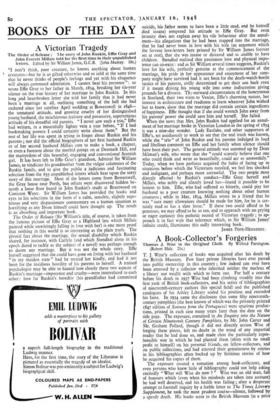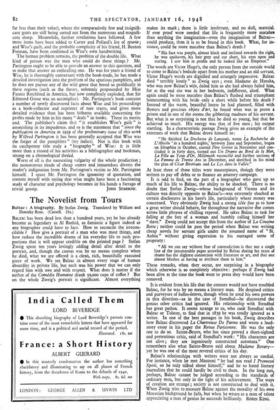A Book-Collector's Forgeries
T. J. WISE'S collection of books was acquired after his death by the British Museum. Few finer private libraries have ever passed into public ownership in this country ; few indeed can ever have been amassed by a collector who inherited neither the nucleus of a library nor wealth with which to form one. For half a century before his death in 1937 Wise had been climbing steadily into the first rank of British Wok-collectors, and his series of bibliographies of nineteenth-century authors (his special field) and the published catalogues of his Ashley Library sealed his position and extended his fame. In 1934 came the disclosure that some fifty nineteenth- century pamphlets (the best known of which was the privately printed 1847 edition of Sonnets from the Portuguese) were spurious produc- tions, printed in each case many years later than the date on the title page. The exposure, contained in An Enquiry into the Nature of Certain Nineteenth Century Pamphlets, by Mr. John Carter and Mr. Graham Pollard, though it did not directly accuse Wise of forging these pieces, left no doubt in the mind of any impartial reader that he had done so, and made clear the particulatly repre- hensible way in which he had planted them (often with no small profit to himself) on his personal friends, on fellow-collectors, and on public collections, and had attested their genuineness by entries in his bibliographies often backed up by fictitious stories of how he acquired his copies-of them.
The exposure created a sensation among book-collectors, and even persons who knew little of bibliography could not help asking excitedly " What will Wise do now ? " Wise was an old man, full of honours which (even when his misdeeds are taken into account) he had well deserved, and his health was failing ; after a desperate attempt to forestall inquiry by a feeble letter to The Times Literary Supplement, he took the most prudent course—silence, followed by a speedy death. His books went to the British Museum (at a price far less than their value), where the comparatively few and insignifi- cant goats are still being sorted out from the numerous and magnifi- cent sheep. Meanwhile, further revelations have followed. A few more items have been added to Carter and Pollard's list of spuria ; and Wise's guilt, and the probable complicity of his friend, H. Buxton Forman, have been confirmed in Wise's own handwriting.
The human problem remains, the problem of the double life. What kind of person was the man who could do these things ? Mr. Partington ought to be able to provide an answer to this question, and to make that answer an enthralling one. He was for years a friend of Wise, he is thoroughly conversant with the book-trade, he has made a detailed investigation into the problem of the spurious pamphlets, and he does not pursue any of the wild geese that breed so prolifically in these regions (such as the theory, solemnly propounded by Miss Fannie Ratchford in America, but now completely exploded, that Sir Edmund Gosse was an accomplice). Mr. Partington's book contains a number of newly discovered facts about Wise and his proceedings as a book-collector and reprinter of rare tracts, and gives more detailed evidence than has been hitherto available concerning the profits made by him in his many " deals " in books. There its merits end. The publisher's claim that " it establishes Wise's guilt " is astonishing in its impudence, and so is the statement that "since the publication in America in 1939 of the preliminary issue of this work by Wilfred Partington it has been generally accepted that Wise was the forger of the pamphlets " (my italics). Nor is this book with its catchpenny title truly a " biography " of Wise : it is little more than a record of his activities as a bibliographer and bookman, strung on a chronological thread.
Worst of all is the nauseating vulgarity of the whole production ; the monotonous tirade of cheap sneers and innuendoes diverts the reader's indignation from Mr. Parting-ton's victim to Mr. Partington himself. I spare Mr. Partington the ignominy of quotation, and content myself with saying that what might have been a fascinating study of character and psychology becomes in his hands a farrago of



































 Previous page
Previous page